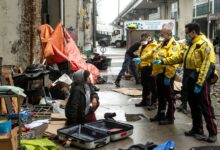Canada’s Mental Health
If I had to assess the mental health of Canada today, I would diagnose it with Posttraumatic Stress Disorder (PTSD). Social Workers in the Province of Ontario are not qualified to make a psychiatric diagnosis, but since Canada is not a person, I will take creative liberties.
 The Diagnostic and Statistical Manual (DSM-5) is the international guidebook for diagnosing mental disorders. The criteria for PTSD involves exposure to a traumatic event (actual or threat of death or serious injury) directly, as a witness, occurring to a family member or close friend, or repeated exposure to the details. The event must cause significant distress or impair the individual’s ability to function. One or more of the following will occur: re-experiencing of memories of the traumatic event, recurring dreams of the event, flashbacks, dissociation or body reactions. Avoidance of one or more of the following will occur: thoughts, feelings, people, places or conversations. At least two kinds of negative thoughts will be experienced, including negative self-belief and blame of self or others. Finally, a heightened state of arousal will be noticeable such as hyper vigilance, sleep disturbances, aggressive, reckless or self-destructive behaviours. Yup! That’s Canada!
The Diagnostic and Statistical Manual (DSM-5) is the international guidebook for diagnosing mental disorders. The criteria for PTSD involves exposure to a traumatic event (actual or threat of death or serious injury) directly, as a witness, occurring to a family member or close friend, or repeated exposure to the details. The event must cause significant distress or impair the individual’s ability to function. One or more of the following will occur: re-experiencing of memories of the traumatic event, recurring dreams of the event, flashbacks, dissociation or body reactions. Avoidance of one or more of the following will occur: thoughts, feelings, people, places or conversations. At least two kinds of negative thoughts will be experienced, including negative self-belief and blame of self or others. Finally, a heightened state of arousal will be noticeable such as hyper vigilance, sleep disturbances, aggressive, reckless or self-destructive behaviours. Yup! That’s Canada!
Canada experienced over 100,000 COVID-19 infections and over 8,000 deaths. The entire country and most of the world has been on lockdown for months. The economy came to a screeching halt and most human interactions went virtual. The country went into distress and its functioning was impaired. Canada is re-experiencing the trauma over and over again on a daily basis despite an overwhelming desire to avoid it. Its thoughts have become very negative, pessimistic and hyper vigilant.
Individuals living within a traumatized society experience a trickledown effect. Individual Canadians are feeling a sense of helpless that is triggering their fight, flight or freeze responses. Symptoms of anxiety and depression increased, drug and alcohol use increased, domestic violence increased, racial inequities are highlighted, protests are ongoing and political tensions run high.
When people lose the sense of control over their environment, all they can control is their internal reactions. Resilience is the ability to adapt flexibly to challenging or adverse life events. It is an ongoing process involving self-awareness and self-care. Yoga, mindfulness, exercise, sleep, social connection and exposure to nature are all recommended but sometimes insufficient. There are times when mental health supports are required to maintain good mental health.
The Ontario Ministry of Health recently announced a huge increase in funding for mental health. Critics indicate that will still leave the system underfunded by hundreds of millions of dollars. Waitlists for publically funded therapy continue to be lengthy. It also does not give clients the ability to choose their preferred modality of treatment. Individuals who do not have private health insurance or the ability to pay out of pocket are unable to access other, often more effective, treatment modalities.
Mental health is uncomfortable to discuss, even by the medical community, but especially by politicians. The topic is often accompanied by stigma, shame and guilt. Healing takes understanding, compassion, time, equity and sufficient funding. It is easier to prescribe a pill that makes the politician-friendly pharmaceutical industry billions of dollars, than to invest in systemic change.
There is a movement called “trauma-informed care” that a few Canadian provinces have adopted. It involves a paradigm shift in thinking from wondering what is wrong with someone to wondering what has happened to them. I would like to see all of Canada become “trauma-informed”. If we understand the impact that trauma has had in our lives and the lives of others, we can start to walk hand-in-hand on the path to recovery.
Paula Reis, MSW, RSW, Trauma Therapist and Clinical Social Worker, Certified EMDR Therapist & EMDRIA Approved Consultant








Redes Sociais - Comentários